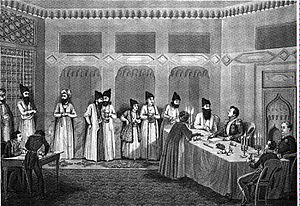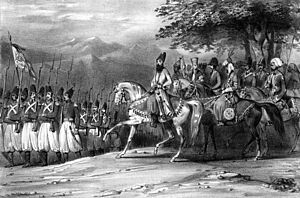Abbas Mirza facts for kids
Quick facts for kids Prince Abbas Mirzaشاهزاده عباس ميرزا |
|
|---|---|

Prince Abbas Mirza, signed by L. Herr, dated 1833.
|
|
| Crown prince of Iran | |
| Successor | Mohammad Mirza |
| Born | 26 August 1789 Nava, Mazandaran, Qajar Iran |
| Died | 25 October 1833 (aged 44) Mashhad, Qajar Iran |
| Burial | Imam Reza Shrine |
| Issue |
|
| Dynasty | Qajar |
| Father | Fath-Ali Shah Qajar |
| Mother | Asiyeh Khanum |
Abbas Mirza (Persian: عباس میرزا; August 26, 1789 – October 25, 1833) was a Qajar crown prince of Iran. He was known as a military leader during several important wars. These included the Russo-Persian War of 1804–1813 and the Russo-Persian War of 1826–1828. He also fought in the Ottoman–Persian War of 1821–1823.
Abbas Mirza is also remembered for trying to modernize Persia's army and government. Sadly, he died before his father, Fath Ali Shah, could pass on the throne. During his time as commander, Iran lost many lands in the Caucasus region to Russia. This happened after the 1813 Treaty of Gulistan and the 1828 Treaty of Turkmenchay.
Contents
Who Was Prince Abbas Mirza?
Abbas Mirza was born on August 26, 1789, in Nava, Mazandaran. He was a younger son of Fath Ali Shah. However, because his mother was of royal birth, his father chose him to be the next king. His father saw him as a favorite son.
Around 1798, when he was only 10 years old, Abbas Mirza became the governor (beglarbeg) of the Azerbaijan region of Persia. He was a smart prince and enjoyed literature. People also noted his simple way of life.
Early Conflicts and Russian Expansion
In 1801, Russia took over Kartli-Kakheti (part of modern-day Georgia). This area had been under Iranian control for a long time. Iran saw this as Russia invading their land. In 1804, the Russian army attacked the city of Ganja. This started the Russo-Persian War (1804–1813).
Fath-Ali Shah made Abbas Mirza the commander of the Persian army. This army had 30,000 soldiers. Both England and Napoleon wanted Abbas Mirza's help. They both wanted to stop Russia's growing power. Abbas Mirza chose to be friends with France. But France could not give him much help in the war against Russia.
Challenges in the First Russo-Persian War
The war started with Iran trying to get back Georgia and northern Azerbaijan. For years, neither side gained much land. However, Abbas Mirza's army faced many defeats against the Russians. They lost battles at places like Gyumri and Akhalkalaki.
Russia kept sending more advanced weapons and soldiers. The tide of the war turned against Persia. In 1812, the Russians won a big battle at Battle of Aslanduz. In early 1813, they captured Lankaran. Abbas Mirza's British advisers warned him to set up guards, but he did not listen. This mistake cost many Persian lives.
The Treaty of Gulistan and Its Impact
In October 1813, Persia was forced to sign the Treaty of Gulistan. Abbas Mirza was still the commander. This treaty made Persia give up large parts of its land in the Caucasus. These lands included modern-day Georgia, Dagestan, and most of what is now Republic of Azerbaijan.
In return, Abbas Mirza received a weak promise that he would become king. These big losses made the British Empire worried. Russia was now a serious threat from the Caucasus region.
Modernizing the Persian Army
The heavy losses in the war made Abbas Mirza realize something important. He needed to train Persia's army in the European style of fighting. He started sending students to Europe to learn military skills. He believed that European-style armies would help Persia defeat Russia. He hoped to get back the lost territories.
Abbas Mirza was inspired by Sultan Selim III's reforms in the Ottoman Empire. He wanted to create a Persian version of the Ottoman Nizam-ı Cedid (New Order). This would make the Qajar army less dependent on local tribal forces.
Steps Towards Military Reform
- In 1811 and 1815, two groups of students went to Britain for training.
- In 1812, a printing press was set up in Tabriz. This was used to print European military handbooks.
- A gunpowder factory and a weapons storage area were also built in Tabriz.
- British advisers constantly trained the Persian soldiers. They focused on infantry (foot soldiers) and artillery (cannons).

Later Wars and Final Years
Abbas Mirza got a chance to test his new army in the Ottoman–Persian War (1821–1823). His reformed army did well and won several battles. This led to a peace treaty in 1823 after the Battle of Erzurum. Persia won this war, even though they were outnumbered. This victory gave the army much-needed confidence.
The Second Russo-Persian War
His second war with Russia began in 1826. It started well, and he won back most of the land lost in the first war. However, the war ended with many costly defeats. Persia was forced to give up its last lands in the Caucasus. These included modern-day Armenia, Nakhchivan, and other parts of Azerbaijan.
All these losses were confirmed by the 1828 Treaty of Turkmenchay. The main reason for the final loss was a lack of reinforcements and Russia's much larger army. These huge losses deeply affected Abbas Mirza. His health began to suffer, and he lost interest in military reform.
Death and Legacy
In 1833, Abbas Mirza went to Khorasan province to restore order. This area was under Persian rule, but not fully controlled. He died in Mashhad in 1833 while doing this work. In 1834, his oldest son, Mohammad Mirza, became the next king after Fath Ali Shah.
Abbas Mirza is best remembered for his bravery in battle. He is also known for his efforts to modernize the Persian army. He was not fully successful in modernizing the army. This was partly because the government in Iran was not very strong at the time. He was also the first to send Iranian students to Europe for Western education. Despite his efforts, he lost more land than he gained in his wars with Russia.
Issue
- Prince Mohammed Mirza, who became Mohammad Shah Qajar
- Prince Bahram Mirza
- Prince Djahangir Mirza
- Prince Bahman Mirza
- Prince Fereydoun Mirza
- Prince Eskandar Mirza
- Prince Khosrow Mirza
- Prince Ghahreman Mirza
- Prince Ardeshir Mirza
- Prince Ahmad Mirza
- Prince Ja'far Gholi Mirza
- Prince Mostafa Gholi Mirza
- Prince Soltan Morad Mirza
- Prince Manouchehr Mirza
- Prince Farhad Mirza
- Prince Firouz Mirza
- Prince Khanlar Mirza
- Prince Bahador Mirza
- Prince Mohammad Rahim Mirza
- Prince Mehdi Gholi Mirza
- Prince Hamzeh Mirza
- Prince Ildirim Bayazid Mirza
- Prince Lotfollah Mirza
- Prince Mohammad Karim Mirza
- Prince Ja'ffar Mirza
- Prince Abdollah Mirza
See also
- Set Khan Astvatsatourian
- Abbas Mirza Mosque, Yerevan
- Russo-Persian Wars
- Samson Makintsev
- Imperial Crown Jewels of Persia
- Military history of Iran
 | Roy Wilkins |
 | John Lewis |
 | Linda Carol Brown |


